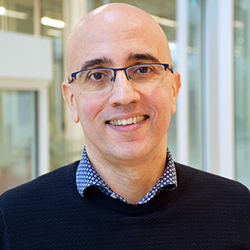
Santo Fortunato
Indiana University - Bloomington
4:30 PM
127 Hayes-Healy
Networks, Communities, and the Science of Science
In this talk I will highlight some key contributions in my focus research areas: network science and the science of science. I will discuss the problem of detecting communities in networks, i.e. subgraphs whose nodes have an appreciably larger probability to get connected to each other than to other nodes of the network. I will address the limits of the most popular class of clustering algorithms, those based on the optimization of a global quality function, like modularity maximization. Validation is probably the single most important issue of network community detection, as it implicitly involves the concept of community, which is ill-defined. I will discuss the importance of using realistic benchmark graphs with built-in community structure as well as the role of metadata.
In the science of science I have focused on the dynamics of impact and the evolution of science. The distributions of citations of papers published in the same discipline and year rescale to a universal curve, by properly normalizing the raw number of cites. Science can be mapped in vector spaces via neural embedding models, and its evolution can be studied via measurements performed on the resulting dynamic knowledge space. We found that modern science is characterized by disciplines increasingly drawing from each other, suggesting that modern advances in a topic are driven or facilitated by tools and ideas from different areas of science.
Bio: Santo Fortunato is the Director of the Indiana University Network Science Institute (IUNI) and a Professor at Luddy School of Informatics, Computing, and Engineering of Indiana University. Previously he was professor of complex systems at the Department of Computer Science of Aalto University, Finland. Prof. Fortunato got his PhD in Theoretical Particle Physics at the University of Bielefeld In Germany. His focus areas are network science, especially community detection in graphs, computational social science and science of science. His research has been published in leading journals, including Nature, Science, PNAS, Physical Review Letters, Reviews of Modern Physics, Physics Reports and has collected over 38,000 citations (Google Scholar). His review article Community detection in graphs (Physics Reports 486, 75-174, 2010) is one of the best known and most cited papers in network science. He received the Young Scientist Award for Socio- and Econophysics 2011, a prize given by the German Physical Society, for his outstanding contributions to the physics of social systems. He is the Founding Chair of the International Conference of Computational Social Science (IC2S2), which he first organized in Helsinki in June 2015. He is Chair of Networks 2021, the largest ever event on network science, a historical merger of the NetSci and Sunbelt conferences. He is author of the book A First Course in Network Science, by Cambridge University Press (2020), the most accessible textbook in the new science of networks.
View Poster